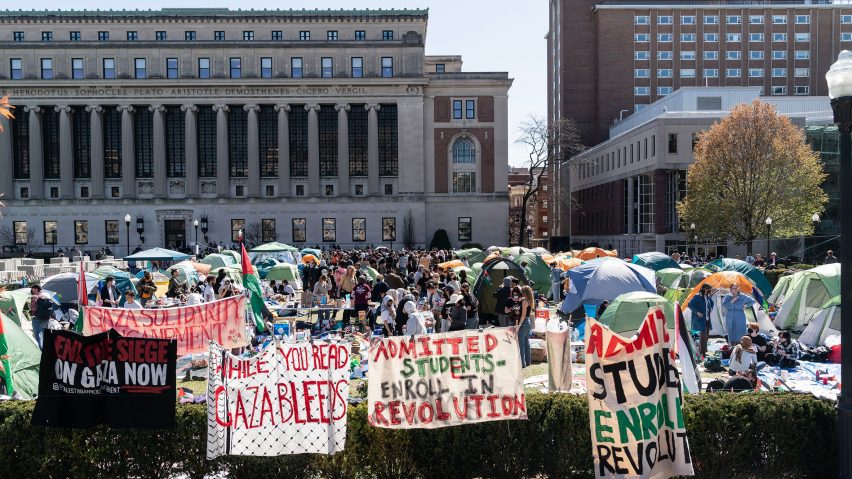
Architects and planners call for boycott of Columbia University after protests
A mix of faculty, students and non-affiliated practitioners in the fields of architecture and design have signed a petition calling for a boycott of Columbia University after its treatment of students protesting the war in Gaza.
The petition was launched under the moniker Architects and Planners Against Apartheid and calls "to boycott all academic events at Columbia University as a whole" and particularly Columbia Graduate School of Architecture, Planning and Preservation (GSAPP) and Barnard Architecture, the liberal arts college that shares the campus.
The petition was launched after the New York City university called in police in response to student protests, which began in mid-April, and have since spread to universities all over the United States.
View this post on Instagram
Kabage Karanja shared the petition on Instagram
The architect-specific petition follows a general one signed by thousands of sympathetic academics.
A week after the petition was signed and sent to Columbia, the protests culminated in the NYPD clearing the campus of protest encampments and clearing an academic building that had been "seized" by the protestors, according to the New York Times, leading to dozens of arrests early Wednesday morning.
"Many faculty within the department are extremely supportive of the course and the students with the encampment and initiatives that are ongoing," Nairobi-based architect and adjunct assistant professor at GSAPP Kabage Karanja told Dezeen.
Kabage, who is a signatory on the petition, which includes more than 180 names, shared a post promoting the petition on Instagram after Wednesday morning's police actions. He said that Architects and Planners Against Apartheid is a group that has come together to "express our solidarity with the cause to free Palestine".
Concern over brutality towards students
"We are only emphasizing this deep concern of the extent of brutality that's being put forward against those students," he continued.
"I think the key request was for a sit down to discuss these matters," said Karanja, referring to the students' request that Columbia divest from companies profiting from the war in Gaza.
He believes that the humanitarian crisis unfolding in Gaza is the key concern of students, and said that architects have a key role to play in protesting the war.
"We, beyond any profession, are front and centre within the conflict, because more often than not architectural buildings, from universities to hospitals to homes, are the targets and the people within those, most of whom are innocent," said Karanja.
He added that many of the professors at the university were signatories on a 2021 petition that called for "supporting student, faculty and staff activism for justice in Palestine" – a petition that was signed by now-dean of GSAPP Andres Jacques.
Destruction and disruption says Columbia
Columbia has maintained that its decision to call on the police was justified, citing damage to property to structures in the private institution and anti-semitic sentiments among the protestors.
"Today's protesters are also fighting for an important cause, for the rights of Palestinians and against the humanitarian tragedy in Gaza. They have many supporters in our community and have a right to express their views and engage in peaceful protest," said university president Minouche Shafik in a statement yesterday.
"But students and outside activists breaking Hamilton Hall doors, mistreating our Public Safety officers and maintenance staff, and damaging property are acts of destruction, not political speech. Many students have also felt uncomfortable and unwelcome because of the disruption and antisemitic comments made by some individuals, especially in the protests that have persistently mobilized outside our gates."
Dezeen has reached out to Columbia University for comment on the Architects and Planners Against Apartheid petition.
The top photograph is via Shutterstock. Comments have been turned off on this story due to the sensitive nature of the subject matter.